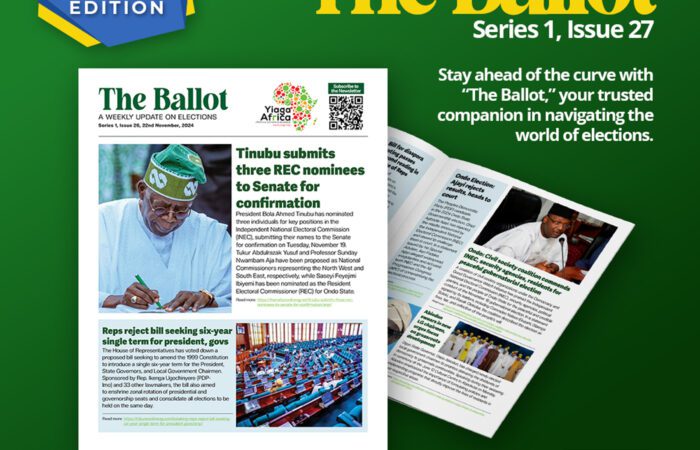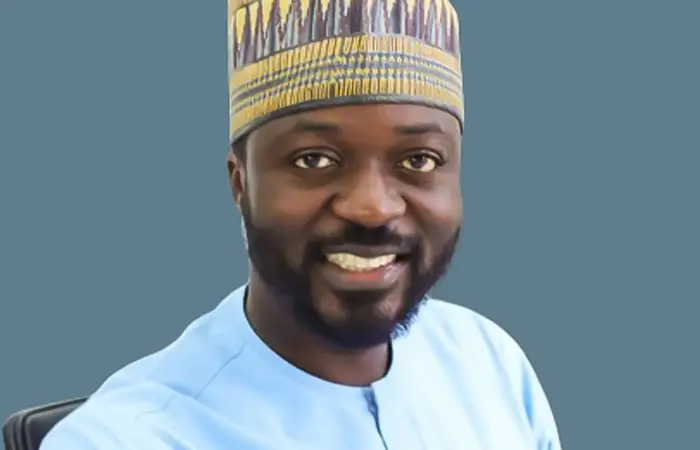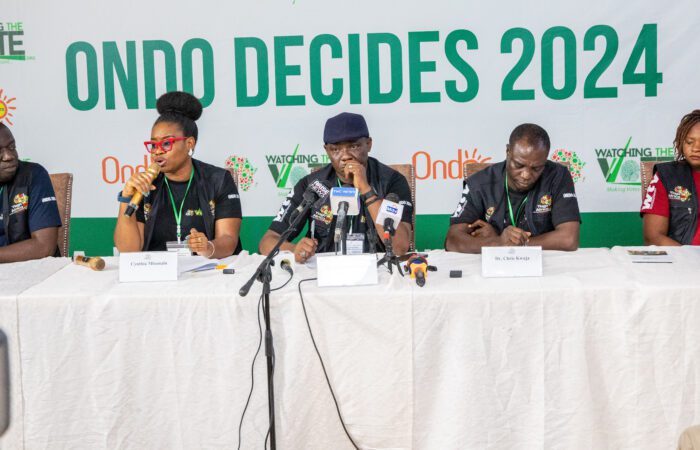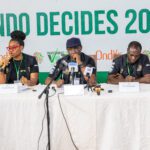Introduction
The 2016 Ondo State Governorship election is scheduled to hold on November 26, 2016[1]. The election is conducted as an out of cycle election due to the Court of Appeal ruling of 2009, which upturned the April 2007 elections owing to irregularities and ordered the swearing-in of the incumbent Governor[2]. The court ruling resulted to the change in the governorship election timetable in the state.
The Youth Initiative for Advocacy, Growth & Advancement (YIAGA) has launched a citizen-led election observation initiative tagged #WatchingTheVote Watching The Vote (WTV) is aimed at enhancing the integrity of elections using technological tools like SMS and evidence-based research methodological tools for election observation. Under #WatchingTheVote, YIAGA will deploy 300 observers to a representative random sample of polling units across the 18 local government areas of Ondo State. The field observers will use coded text messages to rapidly send reports on the conduct of election and the official results. YIAGA’s WTV Project will provide the most accurate information on the conduct of the election and independently verify the accuracy of the results as announced by the Independent National Electoral Commission (INEC) in the Ondo governorship election.
#WatchingTheVote was deployed in the pre-election phase to assess the political and security environment ahead of the November 26 election. This includes assessing the preparation of relevant stakeholders for elections, voter registration, party primaries, campaign finance, election security and voter participation. This pre-election report is a product of meetings and interviews conducted by YIAGA pre-election assessment team in Ondo state. The team met with top officials of the INEC, Security agencies, civil society groups, media and registered voters between October 1st and October 21st 2016.
The delimitation statistics shows that Ondo state comprises 18 local government areas; 203 Registration Areas/Wards, 3009 polling units and 692 voting points. The total number of registered voters is 1,660,055.
1. INEC Preparedness for the elections
Following the publication of the election timetable, the commission commenced the implementation of the following electoral activities: conduct of the Continuous Voter Registration (CVR) held between June 22 – 26, 2016; the distribution of uncollected Permanent Voter Cards (PVC) from the 2015 elections at the LGA INEC offices; publication of the list of party candidates; recruitment and training of election officials; deployment of non sensitive materials from the INEC Headquarters; inspection of Registration Area Centers (RACs); stakeholder meetings and commencement of voter education and public sensitization. The commission target is to make the Ondo governorship elections better in terms of credibility, transparency and acceptability.
Generally, the atmosphere suggests that the commission is working hard to ensure a violence free, transparent, credible and conclusive election on the first ballot. YIAGA commends the Resident Electoral Commissioner and his team for their openness, transparency, and commitment to properly organize the forthcoming elections as well as their engagement with election stakeholders.
Observations, Concerns and recommendations
I. Recruitment of Ad hoc election officials:
Based on the commission’s operational plan 16,723 personnel will be recruited and deployed for the Ondo governorship elections. 80% of these personnel are ad-hoc staff sourced from other agencies like National Youth Service Corps (NYSC) and Federal tertiary institutions. Currently, INEC has not mobilized the required number of officials it needs to successfully execute the election. This is as a result of a shortfall in the number of NYSC members in Ondo state. To address this gap, the Commission opted to source its personnel from students and staff of Federal and State Tertiary institutions. The adopted palliative is to recruit past graduates and ex-corp members as ad hoc officials. However, the challenge to this measure is the very weak due diligence and accountability mechanism, as applicants are merely required to submit a passport photograph and name of guarantor to qualify for employment. The main challenge with this process is, considering the limited time available before the elections; there is a strong likelihood that INEC will not be able to conduct background checks on any of these ad hoc staff ahead of the election.
YIAGA is concerned with this approach adopted by INEC to recruit ad hoc officials from state tertiary institutions and past graduates who may not easily be held accountable. It is worrisome that the Commission is deviating from its usual plan of mobilizing NYSC members from neighboring states, when a state is recording shortfalls in NYSC members. This new approach is subject to abuse by INEC officials and desperate politicians who continue to devise means to compromise and undermine the credibility of elections. INEC should not take the risk to compromise the integrity of the Ondo governorship election on the basis of funding challenges or economic recession. No price is too much to pay to protect the integrity of our elections.
We call on INEC to immediately commence the recruitment of NYSC members from neighboring states; fortunately Ekiti, Edo, Osun states etc border Ondo state.
II. Voters preparedness and Voter Education
The distribution of the PVCs is ongoing at INEC LGA offices across the state. As at October 19th, 2016 only 1,201,438 registered voters have collected their PVCs out of the 1,531,771 PVCs received by the state for the 2015 elections representing 78.4 % collection rate. According to INEC, the distribution of PVCs for the 114, 976 newly registered voters will commence on November 11 – 15, 2016 at the Registration Area/ Ward level. Earmarking five days for distributing 114,976 PVCs is grossly insufficient. It appears the culture of late distribution of PVCs for new registrants has been institutionalized by INEC. This trend needs to be reversed to boost voter confidence in the electoral commission, improve efficiency and reduce voter apathy.
INEC should effectively communicate its distribution plan for the PVCs at the end of the 5-day period of distribution at the Registration Area/Ward level.
In the 2015 general elections, Ondo state recorded 41% voter turnout. This is below average. With this in mind, INEC should sustain its voter education activities especially at the LGA level. There is need for the commission to engage volunteers at the local level on Get-Out-The-Vote campaigns. Other stakeholders should complement INEC by carrying out voter education.
III. Internal oversight mechanisms
Commendably INEC has introduced innovations to improve the welfare conditions and security of the 203 Registration Area Centres (RACs) in the state. YIAGA understands some funds have been released to the LGA Electoral officers to procure welfare materials and ensure early activation of the RACs during the election. The commission’s leadership should strengthen its oversight mechanism on its officers to ensure transparency and due diligence in procurement especially at the local government level.
2. Security
The Inter-Agency Consultative Committee on Election Security (ICCES) was activated during its inaugural meeting on August 13, 2016. Membership of committee is drawn from all the security agencies. ICCES has been holding meetings to review the security plan for the elections. Reportedly, 24,000 police officers will be deployed for the elections at 5 police officers per polling unit. This figure does not include the number of security personnel to be deployed by other security agencies like Nigerian Civil Defence (NSCDC).
Two LGAs have attracted the concerns of all stakeholders. They are the riverine areas of Ilaje and Ese-odo LGA. Idanre and Akoko have been identified as possible flashpoints of electoral malpractices or violence in the elections. YIAGA calls on INEC to immediately deploy a special security plan for elections in these areas to ensure peace, law and order.
3. Conduct of Political Parties
Since the commencement of the electoral calendar, there have been lots of intra party squabbles within the leading political parties. In accordance with the provisions of the electoral timetable, the political parties are expected to have since submitted their list of party agents but as at 21st October, majority of the parties are yet to comply. This is inimical to proper planning, transparency and credibility of the electoral process. We also note with dismay the campaign of calumny recently commenced by some candidates against INEC and clashes between party supporters. We call on political parties to adhere to all laid down rules and regulations and eschew all forms of violence before, during and after the elections.
Conclusion
The Ondo election presents an opportunity to deepen electoral democracy in Nigeria. This is another litmus test for election stakeholders to demonstrate commitment to sanctity of the ballot. The success of the election will be dependent on how all stakeholders engage the electoral process in line with the principles of transparency, accountability and justice. YIAGA remains committed to promoting credible and peaceful conduct of the November 26th elections in Ondo state.
Samson Itodo
Executive Director
________________






